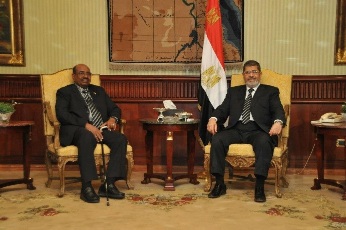Egyptian parties believe ICC-wanted Bashir “a liability”, opposition figure says
February 19, 2013 (KHARTOUM) – A number of Egyptian political parties believe that Sudanese president Omer Hassan al-Bashir is a liability to his country because of his indictment by the International Criminal Court (ICC), a senior opposition figure said today.
 Ibrahim al-Sanousi, who is the Organizational Communication officer at the Popular Congress Party (PCP), made the revelation at a press conference in the party’s headquarters following his return from a tour abroad that took him to Cairo.
Ibrahim al-Sanousi, who is the Organizational Communication officer at the Popular Congress Party (PCP), made the revelation at a press conference in the party’s headquarters following his return from a tour abroad that took him to Cairo.
The PCP is led by Islamist figure Hassan al-Turabi a former close ally of Bashir since the 1989 coup but the two men fell out a decade later. Turabi has since become one of the government’s most outspoken critics, openly predicting Sudan would see an “Arab Spring” style revolt like in neighboring Egypt.
Al-Sanoosi, said that he was told that Bashir is incapacitated as a president due to his inability to travel freely because of the risk that he might be arrested over the warrant which alleges his involvement in war crimes committed in Sudan’s western region of Darfur since 2003.
Al-Sanoosi did not specify which Egyptian parties conveyed this message to him and whether that included the Muslim Brotherhood’s Freedom and Justice Party (FJP).
Mohamed Mursi who had become the first elected president of Egypt was the FJP leader before resigning to assume what he said was a “national” role.
Despite the warrant, Bashir made two visits to Egypt since Mursi came to power last year and officials in Cairo brushed aside demands by rights groups to arrest him asserting that they are not ICC signatories and that African Union (AU) resolutions gives the Sudanese leader immunity.
The deposed Egyptian President Hosni Mubarak, who was overthrown by a popular revolution in early 2011, was one of the first leaders to receive Bashir after the first warrant was issued in March 2009.
The Supreme military council which took over from Mubarak in the interim also ignored the outstanding warrants against Bashir and allowed him to visit in 2011.
The PCP official said that senior leaders in the Egyptian parties told him that Sudan’s ruling National Congress Party (NCP) is responsible for the country’s partition into north and south in July 2011 and thus jeopardizing Egypt’s water security.
Egypt currently holds dominant right on Nile water following powers granted by a 1929 colonial-era treaty with Britain. Its subsequent 1959 deal with Sudan gave the two downstream countries more than 90 percent control of Nile waters.
Under the original deal, Egypt is entitled to 55.5 billion cubic meters of water a year, the lion’s share of the Nile’s total flow of around 84 billion cubic meters.
Upstream countries have tabled the Nile Basin Initiative (NBI) in 1999 which would strip Egypt of its veto right over all upstream projects including irrigation and hydropower. This was signed by six nations that are set to have it ratified this year by the respective parliaments. Sudan has stood firmly in opposition for amending the original treaty.
On domestic issues al-Sanoosi warned that East Sudan may join the Sudan Revolutionary Front (SRF) which is fighting Khartoum on multiple fronts. He claimed that secessionist sentiments are also beginning to emerge in that part of the country.
“We do not know if that [self determination] occurred whether the [East Sudan] region will join a neighboring country or establish its own state but the situation is serious and the East [peace] accord is dominated by the ruling National Congress based on quotas and political bribes to some of the East’s leaders” the PCP official said.
This month members from Eastern Front (EF) cautioned the government that it needs to adhere to the 2006 peace deal and end the breaches to it.
Eastern Sudan has the country’s highest poverty rate, the highest level of child deaths under five years old, and the most children between the ages of six and 13 out of school, says the United Nations Development Programme (UNDP).
(ST)
